The Cool Factor in Presidential Elections: Oliver DeMille
March 25th, 2014 // 2:34 pm @ Oliver DeMille
Choosing a Candidate
“Americans elect the ‘cool’ candidate as president in the Entertainment Age. Carter was more cool than Ford, Reagan was cooler than Carter and Mondale, Bush I was cooler than Dukakis but not as cool as Clinton, Clinton was cooler than Dole, Bush II was more cool than Gore and Kerry, and Obama was cooler than McCain and Romney.
“A simple ‘cool’ test (who is more likely to sing, dance, play the saxophone, fuel high school ambitions in the youth, etc.) would have accurately predicted every one of these elections. It’s high school musical at the White House. As for the 2016 presidential election, no potential candidate so far is nearly as ‘cool’ to a majority of the national electorate as Hillary Clinton. Nobody is even close.”
This thought touched a chord with many, and I’ve been asked to elaborate on it. So here goes.
The electorate wants a cool president, but one with at least a little experience in government. If Republicans are going to win the White House in 2016, they need a cool candidate — cooler than Hillary Clinton.
The 2016 Players
There is precedent for things moving quickly in presidential politics. Barack Obama wasn’t even on the national scene until 2005, three years before he won the presidency in 2008. Whoever can beat Clinton in 2016, needs to be elected to high office in 2014 (or before).
Some people think that one of the current Republican Governors or Senators can win in 2016, but no candidate has risen to a level of cool that will compete with Clinton.
Some conservatives try to deal with this by arguing that the electorate should change the way it chooses a president—and I agree—but this isn’t likely.
In current America, the “coolest” candidate will win. To date, the Republicans have nobody really cool in this sense.
By the way, a candidate doesn’t have to be actually cool, just cooler than the opponent. And Hillary Clinton is the standard for 2016. Arne Duncan is a close second for Democratic cool, with Timothy Shriver just behind.
That’s three Democrats that are cooler than any known Republican right now.
To get more specific, in the current electorate, winning the White House means being seen as the most cool candidate by women, Latinos, and independents. Rand Paul, Paul Ryan, and Sarah Palin are considered cool by many independents. Just as many independents like Hillary, however, and she also polls higher with Latinos and women.
Extreme Makeover: White House Edition
Marco Rubio, Ted Cruz and Jeb Bush are considered cool by many Latinos, but not as cool as Clinton, and Hillary leads among women and independents. Chris Christie, Bobby Jindal, Scott Walker, and Mitt Romney are behind Clinton in all three of these swing groups.
The entire list of Republican potentials is seen as less cool than Hillary. If Republicans want to have any chance in 2016, either some new face needs to rise in 2014, or a past leader who can project as genuinely cool needs to effectively re-enter the fray.
For example, Scott Brown might be able to pull it off. Condoleezza Rice might compete well with Clinton, if she could get through the Republican primaries (she won’t).
Jon Huntsman might present himself as cool—more dirt bike and less boring policy wonk—but he’d need a public makeover. A lot of those listed above, including Rand Paul, will need such a makeover if they want to compete with Hillary. Ben Carson or any other newcomer would have to act now.
It’s way too early to call a national election, of course, but if Republicans don’t raise up a cool leader in 2014 who can compete for the White House in 2016, the executive election is all but over already.
Since this person hasn’t yet caught the national attention, 2014 is the last chance for them to win an election.
 Oliver DeMille is the New York Times, Wall Street Journal and USA Today bestselling co-author of LeaderShift: A Call for Americans to Finally Stand Up and Lead, the co-founder of the Center for Social Leadership, and a co-creator of TJEd.
Oliver DeMille is the New York Times, Wall Street Journal and USA Today bestselling co-author of LeaderShift: A Call for Americans to Finally Stand Up and Lead, the co-founder of the Center for Social Leadership, and a co-creator of TJEd.
Among many other works, he is the author of A Thomas Jefferson Education: Teaching a Generation of Leaders for the 21st Century, The Coming Aristocracy, and FreedomShift: 3 Choices to Reclaim America’s Destiny.
Oliver is dedicated to promoting freedom through leadership education. He and his wife Rachel are raising their eight children in Cedar City, Utah.
Category : Blog &Citizenship &Current Events &Government &Independents &Leadership &Liberty &Politics
Ted Cruz and Mike Lee are Heroes.
October 12th, 2013 // 3:11 pm @ Oliver DeMille
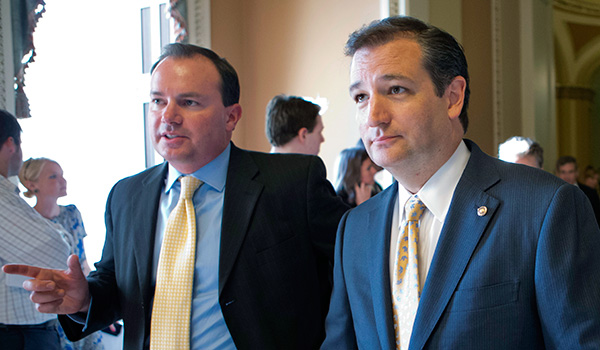
At some point, America is going to have to face reality. We can’t keep increasing government spending, debt, and borrowing without eventually paying for it. But the problem is deep:
When Americans are asked if they want to get rid of our $17 trillion debt and huge deficits, they say, “Yes.”
When they are told that we need to cut any actual government spending program, any program, they say, “No.”
What gives? Essentially, Americans want to get more from government but pay less. Ted Cruz was popular among conservatives when he stood against Obamacare, but when the media pushed back, conservative support decreased.
Mike Lee was popular in his home state when he took the same stand vocally, but his popularity decreased a little when he took real action to help slow the negative facets of Obamacare. Other leaders have seen the same thing.
Too many of the American people want our leaders to reduce our out-of-control debt and deficits, but they don’t want it to be hard. They want it to be easy. They support those who talk tough, but withdraw support when a leader takes courageous action.
Mike Lee, Ted Cruz, and others, including a number of House Republicans, who take a stand against expanding government are heroes, pure and simple. This is true of anyone, from any party, who stands for what our nation really needs. Their stand against the expansion of big government deserves a lot more support.
Our national economic problems are going to get worse and worse until leaders take a stand to reduce spending and borrowing. But when some leaders do this, popular opinion frequently turns against them. If this remains true, Americans deserve the economic difficulties that will keep growing. If we want something better, we need to stand up for it.
Instead of complaining that our leaders don’t do enough of the right things, we need to strongly support the few leaders who actually do take action. Instead of repeating the national mantra, “Why can’t everyone just get along in Washington?,” we need to be the kind of citizens who know that a better future is worth fighting for. Thank goodness some of our leaders understand this.
Lee or Cruz for president. Or, if you’re a Democrat, look up the recent speeches of Joe Manchin. Bring in Paul, Rubio, Ryan, and anyone else who is standing for common sense. We need to stand behind leaders, regardless of party, who actually see what is needed and do something about it—regardless of how it plays in the polls. Those who do this are today’s heroes.
 Oliver DeMille is the New York Times, Wall Street Journal and USA Today bestselling co-author of LeaderShift: A Call for Americans to Finally Stand Up and Lead, the co-founder of the Center for Social Leadership, and a co-creator of TJEd.
Oliver DeMille is the New York Times, Wall Street Journal and USA Today bestselling co-author of LeaderShift: A Call for Americans to Finally Stand Up and Lead, the co-founder of the Center for Social Leadership, and a co-creator of TJEd.
Among many other works, he is the author of A Thomas Jefferson Education: Teaching a Generation of Leaders for the 21st Century, The Coming Aristocracy, and FreedomShift: 3 Choices to Reclaim America’s Destiny.
Oliver is dedicated to promoting freedom through leadership education. He and his wife Rachel are raising their eight children in Cedar City, Utah.
Category : Blog &Citizenship &Current Events &Economics &Government &Independents &Leadership &Politics &Prosperity
A Funny Thing Happened on the Way to Big Government
June 17th, 2013 // 12:01 pm @ Oliver DeMille
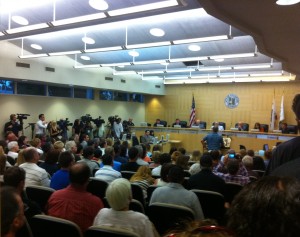 Local government is increasingly the place where things are getting done.
Local government is increasingly the place where things are getting done.
As the party system has created gridlock in Washington, less is getting accomplished on Capitol Hill.
In a funny way, this has created a situation that is more like the American Founding era than anything we’ve experienced in over a century—the real place to get things done in government is at the local and state levels.
The bad news is that Washington continues to spend, borrow, inflate the currency by printing money, and over-regulate in nearly every facet of modern life.
Its growth is slowed by partisan conflicts, but it hasn’t started shrinking.
Not by a long shot.
Another piece of bad news is that the national parties and their teams are pushing their agenda even more vigorously at the local levels.
This means that the party controlling the White House will have a much larger budget and ability to promote national goals in each city, county and state.
The good news is that regular people can have more influence and make more of a difference at the local and even state level.
Most citizens have long felt they can’t really do much to improve Washington—the national government is just too big, too far removed, too immune to change.
But at the local level it’s a different story.
People who really want to get involved can make a major impact on local government.
The key is consistency.
Those who keep at it will eventually learn how to be effective, and as they involve their friends and colleagues they can become a real force for good.
This system, with a lot of citizen involvement at the local level, is what the American founding fathers envisioned.
In a strange way, it is now becoming more of a reality.
As David Brooks wrote in The New York Times, “The happiest people these days are those who leave Washington and get elected mayor or governor. The most frustrated people are people who were mayor and governor and get elected in the Senate. They end each day knowing they were busy. They’re just not sure they accomplished anything.”
Local government is the new power center, and regular people who want to make a real difference can now do so at levels not seen for over a century.
Get involved.
It’s unclear how long this new reality will last, but for now there is a window of power for concerned citizens.
***********************************
 Oliver DeMille is the chairman of the Center for Social Leadership and co-creator of Thomas Jefferson Education.
Oliver DeMille is the chairman of the Center for Social Leadership and co-creator of Thomas Jefferson Education.
He is the author of A Thomas Jefferson Education: Teaching a Generation of Leaders for the 21st Century, and The Coming Aristocracy: Education & the Future of Freedom.
Oliver is dedicated to promoting freedom through leadership education. He and his wife Rachel are raising their eight children in Cedar City, Utah.
Category : Blog &Citizenship &Community &Constitution &Current Events &Featured &Government &Independents &Leadership &Liberty &Mini-Factories &Politics
Summer Reading for YOU
June 14th, 2013 // 10:56 am @ Oliver DeMille
5 Recommended Books for the Summer
by Oliver DeMille
“Dad, can you read to me more?” Meri asked me.
Surprised, I looked up from my book and responded, “Oh, sure.”
I took the book she was reading and read a chapter aloud to her. When I finished, I handed her the book.
“Thanks, Dad,” she said. “I could have read it myself, but I just love it when you read. I mean, in the winter you read to us a lot, and with all our classes and other activities it seems like I learn a lot from you, and all my other teachers.
“In the summer is when Mom reads to us the most, out on the couch on the porch, but I don’t learn as much from other people, and it seems like you don’t read to us as often.”
Meri walked away with her book, but our little conversation got me thinking. I’ve always taught that winter is the key time for family reading. But I think that summer is the most important time for kids to see their parents reading—mainly because they tend to spend less time on official “schooling” activities and more relaxed time with parents (and observing their parents’ leisure activity choices) during the summer months.
When children and youth see their parents reading a lot, they naturally value reading. When children and youth value reading, they read more.
Our choices during summer to make a huge difference in the education of our kids, and one of the most impactful things a parent can do is set the example of reading. If your kids see you reading books a lot, especially during summer leisure, not only are you filling your bucket of ideas and resources, but the example you set can drastically influence them. Reading is powerful!
On the national scale, all free societies are reading societies, and reading starts in the home!
Here’s a great summer reading list* that I’m following. I’m making sure all my children and youth see me reading these books this summer. And I’m really going deep—by reading with a highlighter and pen, taking notes and marking quotes as I go. I’m sharing these books because I hope you’ll do the same:
The Early History of Rome, by Livy
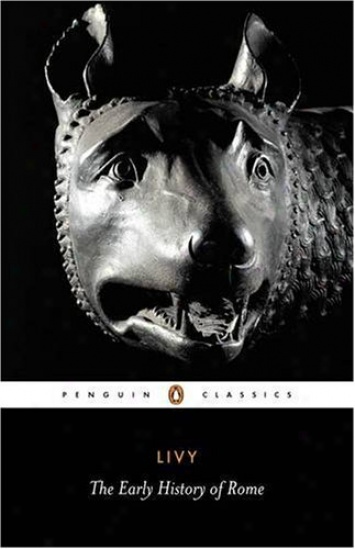 This great book isn’t part of the Great Books of Western Civilization, but it could be. I want my children and youth to see that I care about history, and I’ll look for opportunities to share Livy’s stories with them and talk about the connection between reading history and being successful leaders in life.
This great book isn’t part of the Great Books of Western Civilization, but it could be. I want my children and youth to see that I care about history, and I’ll look for opportunities to share Livy’s stories with them and talk about the connection between reading history and being successful leaders in life.
Rascal, by Chris Brady
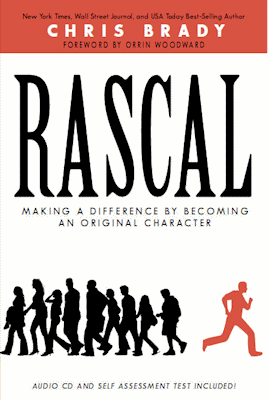 I want my kids to know what a “rascal” is–at least the way Brady defines it. I want them to be the kind of people this book promotes, and I can’t wait for them to ask me about this book.
I want my kids to know what a “rascal” is–at least the way Brady defines it. I want them to be the kind of people this book promotes, and I can’t wait for them to ask me about this book.
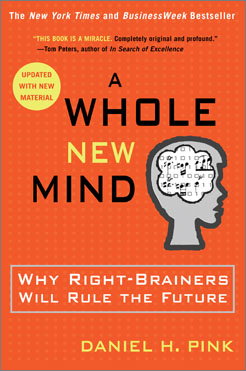 A Whole New Mind, by Daniel Pink
A Whole New Mind, by Daniel Pink
I want my youth to be innovative, creative, and have initiative. This is one of the hardest things to teach, but I’ll look for opportunities to discuss these things as I read this book.
Isaiah, in the Bible
I love sharing scriptural verses with the kids and discussing the meanings and lessons. It leads to a lot of important conversations with the kids about the most important topics.
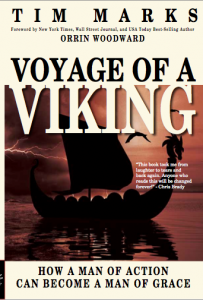 Voyage of a Viking, by Tim Marks
Voyage of a Viking, by Tim Marks
I can’t wait to talk to my kids and youth about this book! It’s about seeking for greatness, learning from your mistakes, not settling for mediocrity, and constantly improving yourself. I know the title of this book will have all my kids asking me questions about it!
Chillin’ and Grillin’
This week I’ve been reading these books in the evenings outside by the grill and the court where the kids play basketball, in the hot afternoons near the swamp cooler, and in the kitchen before meals and during cleanup after the family eats. I’ve taken turns with each book, so I’m a few chapters into all five of them, but I’ve had more than one discussion about each with the kids.
Tonight as dinner started, I got everyone’s attention and said, “I’m reading this awesome book. Actually, I’ve read it before but I’m re-reading it and I want to share something from it that really touched me.”
Everyone quieted down and listened. “Here goes,” I said. Then I read from Voyage of a Viking:
Kids can be pretty relentless in teasing one another, and the kids in my school were no different. I had never before been the subject of teasing and bullying, so it was a new experience for me. You see, news of my parents’ divorce got around town pretty quickly, and it wasn’t too long before the news hit my schoolyard.
The little kids in the family were leaning forward at full attention, and even the teens were paying close attention. I kept reading:
And then the teasing began. ‘There’s Tim, and he doesn’t have a dad,’ the kids would whisper to each other and taunt me.
I stopped reading and asked, “How would that make you feel?”
“I’d hate it!” Meri said forcefully. The other kids agreed.
After they shared their feelings, I asked, “Have you ever been teased like that?” We discussed this for a while, then I asked everyone, “Okay, I have another question. Have you ever teased anyone this way?”
“No way!” Meri exclaimed. She is nothing if not earnest.
“Are you sure?” I asked slowly.
Everyone considered. “Well, actually,” Meri said, then she told several stories of when she wasn’t very nice to people in her life. The other kids shared too, and we had a great conversation about being good friends and also standing up against bullying even when the victim isn’t your friend.
When I read what happened next in the book, everyone got even more interested. You’ve got to read it to get it! We spent dinner talking about this and discussing it.
At the end, I said, “I’m so excited to read the rest of this book.”
“Me too,” America said emphatically. “Meri” is nine years old, and she loves to read. I don’t know when she’ll read Voyage of a Viking, but I’ll be sharing from it and the others on my list all summer.
Actually, I’m having a hard time reading it because after our dinner discussion my visiting twenty-year old daughter Sara borrowed my copy and is reading it. Oh well, she reads fast. In the meantime, I’ve got the other four books.
Tomorrow at breakfast I’m planning to share the following quote from Livy, where he says that he is excited to write about Rome because, as he puts it:
I shall be able to turn my eyes from the troubles which for so long have tormented the modern world.
I’ll ask the family, “Why do you think people always feel that the modern, current world is so chaotic and hard and that the people in history somehow had things more simple? I mean, Livy thought this clear back in the time of Jesus Christ.”
This question is more for the teenagers, while yesterday’s conversation was perhaps more accessible to the younger kids. But everyone takes part in all of it. The older ones (me included!) bear reminding about Core Phase issues, and the younger ones benefit immensely by being including in the discussion of “serious” topics of academic and intellectual interest.
I could go on and on sharing examples of how to do this, but I’ve got a book calling to me. I’ve finished work for the day, and I want to read in the yard this evening—so I’ll be near the kids and we can talk.
Maybe I’ll teach them from one of these five books I’m reading, or maybe Meri will bring me a book of her own to read and talk about. Or perhaps we’ll all just sit in the warm evening and watch the sunset and talk. I often have the stack of all five books around with me, so I can just pick and choose which to read and share.
In any case, I’m excited to keep reading and sharing my book list this summer. This first week has been great. I can’t wait to see what we’ll learn about together in the months ahead.
Summer is a great time for education. So just get out your books, start reading, and share! The impact on freedom is huge.
Also check out Summer Reading for Kids >>
*Most of these books are available at your local library. Or, check the affiliate links to see amazon reviews, etc.
Category : Blog &Book Reviews &Business &Citizenship &Culture &Education &Family &Generations &Independents &Leadership &Liberty &Mission &Statesmanship
Emotion and Politics
February 18th, 2013 // 10:35 pm @ Oliver DeMille
 In all the commentaries about the president’s 2013 State of the Union address and the responses by Marco Rubio and Rand Paul, one really stood out.[i]
In all the commentaries about the president’s 2013 State of the Union address and the responses by Marco Rubio and Rand Paul, one really stood out.[i]
Democratic thought-leader Van Jones said it outright: “Marco Rubio is dangerous for Democrats.”[ii]
Why?
Because he gets emotional about the issues, and, as Jones pointed out, genuine, authentic, caring emotion sways American voters.
The GOP has long acted as if all politics needs to be intellectual, and emotions are often treated as weakness or shallowness by the Right.
But the electorate loves emotion, and votes accordingly.
Put simply, if a top Republican can unite large segments of the populace behind authentic emotional passion, he or she will be a serious challenger in the 2016 election.
The last Republican candidate to elicit such raw emotion was Ronald Reagan.
Jones went on: “Marco Rubio is to the heart, what Paul Ryan is to the head…. [Rubio’s] ideas are extreme, the Tea Party loves this guy, but he is dangerous for Democrats because he can connect in a way that other people with those ideas cannot.”[iii]
Bill Clinton and Barack Obama appealed to both the mind and the heart, and so did Reagan.
Indeed, great presidents know how to effectively communicate in both realms.
The problem for the GOP in 2016 is simple: primary voters want something different than the general electorate.
While Republican primaries usually pick a nominee based on emotion, and then disappointed Republicans intellectually reason that they should vote for him because he is better than the liberal alternative, the better course would be to use intellect in the primaries and select a candidate that can win the general election by swaying the emotions of the general populace. While Democratic primaries tend to select candidates based on intellect (emphasizing who can win the White House), the general election emphasizes emotions.
This is a headache for a Republican party deeply divided between the following factions:
Tea Parties: “We’re broke, and going more broke. Fix the finances. America is in decline because our financial house is a mess—and getting rapidly worse. Freedom means small, limited government that lives within its means and unleashes the power of free enterprise.”
Fiscal Conservatives: “If we don’t get our fiscal house in order, we will continue to decline. But drop the angry tone. Let’s just fix the finances. Freedom demands wisdom.”
Social Conservatives: “It’s all about morals. If we don’t turn our hearts to God, we don’t deserve our freedoms or prosperity. We are in decline because our values are under attack. Freedom means moral strength.”
Compassionate Conservatives: “Government should be limited, fiscally strong, and attentive to real social needs. America is in decline because it is widely divided by classes and racial conflicts, and the solution is for government to wisely reform, cut spending, raise taxes where needed, and emphasize public-private cooperation to increase social justice. Freedom flourishes when government and the private sector work together.”
Neo-Conservatives: “Free markets are flourishing in the world, and the future of freedom has never been brighter. American isn’t in decline, we just need a solid conservative in the White House. Freedom means taking responsibility in the world.”
Ron Paul-Style Revolutionaries: “We’re way past reforming things. We need an outright revolution, and we need a great man or woman to lead it. Progress and decline are simply a matter of who leads us, and it’s time to get a great leader. Fix the finances, stop being the world’s policeman, and make America free and great again. Freedom is cool.”
There are also a number of Special-Interest Republicans who focus on one central theme (such as immigration, gun control, etc.) in their voting.
In the end, all of these groups will most likely support the Republican candidate, but during the primaries each will put forth its favorites.
This is the perhaps the biggest irony in American presidential politics: While Republican primary voters are generally very emotional, the Right usually turns intellectual during general elections.
The problem seems to be that the various factions of conservatives have a hard time getting passionate about supporting other kinds of Republicans.
They see the need to unite behind one candidate, but their support is mostly intellectual—not raw, gut emotion.
Democrats don’t seem to deal with the same challenge.
They are emotional (as well as intellectual) during the primaries, but they generally transfer their emotional support to the chosen candidate—regardless of who they supported in the primaries.
Intellect will be required for a candidate from either party to make it to the 2016 general election.[iv]
Once the two top candidates are selected, their biggest challenge will most likely be convincing Latino and independent voters that they care about their interests and needs.
No candidate is likely sway either group without a genuinely strong emotional appeal.
The GOP’s biggest benefit in 2016 might be President Obama.
If his administration continues its drive to the left—continued spending, taxing, borrowing, inflating the dollar, and regulating—most conservatives will be deeply emotional about politics after four more years.
If their frustration reaches a boiling point, we may witness a waking giant.
[i] Perhaps the most striking thing about the event is that fewer people watched the State of the Union address than any in the last 14 years.
[ii] CNN commentary on the 2013 State of the Union.
[iii] Ibid.
[iv] It always is.
***********************************
 Oliver DeMille is the chairman of the Center for Social Leadership and co-creator of Thomas Jefferson Education.
Oliver DeMille is the chairman of the Center for Social Leadership and co-creator of Thomas Jefferson Education.
He is the author of A Thomas Jefferson Education: Teaching a Generation of Leaders for the 21st Century, and The Coming Aristocracy: Education & the Future of Freedom.
Oliver is dedicated to promoting freedom through leadership education. He and his wife Rachel are raising their eight children in Cedar City, Utah.
Category : Blog &Government &Independents &Leadership &Politics











